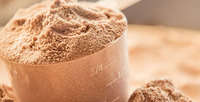Sports nutrition bulks up

Muscle milks, protein bars and energy gels, while once sports nutrition products were solely used by bodybuilders and Olympic athletes, it seems today the appeal of these products has stretched out to the UK’s everyday exercisers. New research from Mintel finds that as many as one in four (24%) Brits have consumed a sports nutrition product in the past 3 months, rising to 42% of men aged 16-24.
With many consumers fuelling up on sports nutrition, there has been a sprint in sales of the products. UK consumers spent £66 million on sports nutrition food and drink products in 2015, up by 27% from 2013 when sales stood at £52 million. And it seems that rather than an occasional added extra, these products are now store-cupboard staples. Almost half (47%) of consumers who use the products say these are part of their everyday diet.
Setting the pace for consumption, Mintel research finds that young consumers and high-earners are the core users of these products. Over two in five (42%) UK consumers aged 16-24 have consumed sports nutrition products in the past three months, as have three in 10 (31%) of those with a household income of over £50,000. These groups are also the most likely to be keen exercisers – while 50% of Brits say they exercise for 30 minutes more than once a week, this rises to 64% of UK consumers aged 16-24 and 63% of those with a household income of over £50,000.
Emma Clifford, Senior Food and Drink Analyst at Mintel, said: “Used by one in four people, sports nutrition food and drink enjoys surprisingly widespread use despite its specific function as supporting sports and fitness. As a result, sales are booming and at the heart of this strong performance is that the appeal of these products is expanding beyond the small pool of the most elite sportspeople and gym fans. The category is increasingly attracting ‘lifestyle’ users who see these products fitting in with a healthy, active lifestyle. Fuelling the shift towards the mainstream use is the growing availability and visibility of accessible snacks and drinks from sports nutrition brands.”
In terms of today’s usage, the top two sports nutrition products used are protein based. Over the last 3 months around one in ten (9%) Brits have eaten protein bars while the same number (9%) have used protein powders. However, it’s not only sports nutrition products that are bulking up with protein. According to Mintel Global New Products Database (GNPD), the number of food and drink products launched in the UK with a high-protein claim rose by 97% between 2014 and 2015 and 498% between 2010 and 2015.
Outside of sports nutrition products, 25% of UK consumers have consumed any high-protein food and drink in the past three months, rising to 35% of people who exercise at least once a week. And many consumers are in agreement in terms of the benefits of these products, over one third (36%) of adults believe there are at least three separate advantages to eating or drinking high-protein products. The leading factors among those who use high-protein products is to make sure they’re getting enough protein (41%), to generally support a healthy lifestyle (37%) and to keep fuller for longer (36%). What’s more, a quarter (25%) of consumers who use these products say they do so to lose or maintain weight.
“High-profile activity from big-hitting brands has given the high-protein trend mainstream visibility in recent years. The wide-ranging benefits linked to protein have been responsible for pushing it into the spotlight in the context of healthy eating. These multiple positive associations mean that usage of high-protein products is not limited to consumers with a single dietary want or need.” Emma comments.
While consumers who don’t see any benefit of high-protein products are in the minority at just 29%, it seems not all consumers are agreed on the power of protein. Over a third (37%) of Brits say the current focus on high-protein diets is just a fad.
On the other hand, many consumers are hungry for further high-protein product innovation. Over a quarter (28%) say there aren’t enough high-protein prepared meals, while 24% would be interested in adding protein powder to meals to increase their protein intake.
“Despite a rise in high-protein new product development in prepared meals, these options remain few and far between, suggesting ripe opportunities for further development in this area.” Emma concludes.

